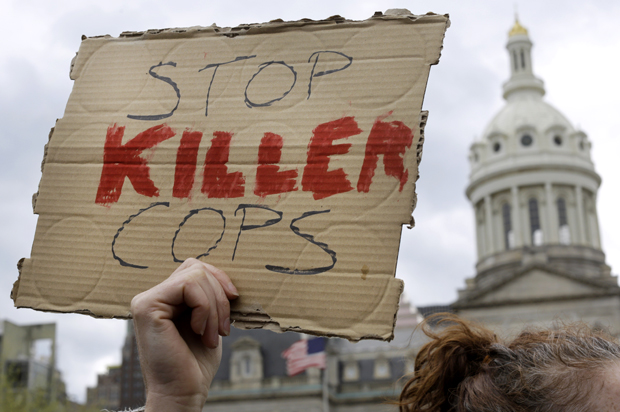As cable news covers the Baltimore riots by asking our greatest social critics to weigh in on the big questions that inevitably follow a social breakdown of this magnitude, some of us might find ourselves asking comparatively picayune questions; like, what can lawmakers do to ensure that whatever happened to Freddie Gray never happens again?
That impulse is entirely understandable, especially after smoldering convenience stores and fighting in the streets have laid bare the politics of class and race in America in such an ugly, unvarnished fashion. During moments like these, focusing on devising the best administrative changes and technocratic reforms can feel akin to relief. Crafting the best possible system of civilian oversight looks easy when compared to grappling with all too human political forces like bigotry, greed and power.
But that impulse, however sympathetic it may be, should be resisted — at least for the time being. Because just as the profoundly related crisis of economic inequality is not the result of impartial forces like globalization, but rather the consequence of various political decisions, so too is the violently dysfunctional relationship between Baltimore’s Police Department (BPD) and its African-American community a political problem. The problem: the often disgraceful actions (in the streets and in Annapolis) of Maryland’s formidable police unions.
For example, take a look at this Tuesday piece from the Intercept’s Lee Fang, who reminds us that the BPD lacks proper oversight because of union lobbying in Annapolis. As Fang notes, even though Gov. Larry Hogan is expected to sign multiple law enforcement reform bills into law soon, the most substantial possible checks on police brutality — “including legislation to add a civilian review process and to have state prosecutors investigate all killings by police” — will not be among them. According to Fang, that’s largely because they never even made it out of an earlier legislative hearing.
The story is much the same when it comes to proposed changes to Maryland’s so-called Law Enforcement Officers’ Bill of Rights (LEOBoR), which have repeatedly stood in the way of real accountability and real reform. The Maryland LEOBoR, which was enacted in the mid-1970s, has made it profoundly difficult for lawmakers or prosecutors to keep the state’s police under control. It imposes narrow boundaries on when — and how — the behavior of law enforcement officers can be reviewed. According to Reason’s Mike Riggs, these bills of rights (which exist in 14 other states besides Maryland) usually make investigating an officer so difficult, many departments put it off, at least until something terrible happens and they no longer can.
At the very least, Maryland’s LEOBoR played a role in turning the Freddie Gray killing into the disastrous scandal it’s become. Why, many asked, were the officers involved in the affair not interviewed more speedily by city officials? The state’s LEOBoR was undoubtedly one reason; it mandates that, after an incident, an officer’s superiors not question him for the next 10 days. And according to the Marshall Project, a “standard” LEOBoR also requires that an officer is only questioned by one or two people — fellow police, exclusively. One expert on law enforcement accountability described it to the Marshall Project as “a scandal, really.”
As you probably guessed, efforts to reform the LEOBoR in Maryland have foundered, with police union lobbying mostly to thank. But while these legislative changes are necessary and would almost certainly influence the behavior of future Baltimore cops, one of the most compelling reasons for activists and sympathetic lawmakers to take on police unions can’t be measured or translated into legalese. It’s the secondary and tertiary effects that winning a fight against cop unions will have not only on the state’s politicians, its citizens and, most importantly, its cops.
To be blunt: Baltimore’s police have forgotten their identity and purpose. Gorging on decades of nearly unrestrained influence — in city hall and the state capitol — has made them out of touch, arrogant and cruel. This was obvious last week, when Fraternal Order of Police Lodge No. 3 president Gene Ryan called those seeking accountability for Gray’s death a “lynch mob” and then refused to apologize for his insensitive and racially inflammatory remark. But it was never more evident than when that same union released an unsolicited statement in response to the murder of two NYPD officers by Ismaaiyl Brinsley.
If you want to understand why an increasing number of Baltimore residents feel as if they’re living under a military occupation, just read the statement — and keep in mind that it was released soon after Brinsley’s murders, which was a volatile time. “Once again,” the union declared, “we need to be reminded that the men and women of law enforcement are absolutely the only entity standing between a civilized society and one of anarchy and chaos.” Living under such warzone conditions, the statement continued, required “those in positions of power” to offer “unequivocal support of law enforcement.” Anything less and the BPD would be unable to “preserve our nation.”
That the union was imperious and deluded enough to release such a statement was itself scandalous; and the fact that it didn’t inspire widespread condemnation may be even worse. There are many technocratic responses to the death of Freddie Gray, but before people in Baltimore and the many cities in the U.S. like it can feel confidence in their law enforcement and elected representatives, the mindset embodied in that statement needs to change.

